Can Kids Be Forgiving?
In a recent We R 3C, Inc. presentation, an attendee posed the following question; “Can Kids Really be Forgiving?” It most certainly sounds like a wonderful concept, but in most instances, kids are simply not motivated in this manner. However, when that question is answered within the context of the We R 3C™ Program, it has proven to be yes, kids can develop the intrinsic motivation to forgive if the ‘framework’ exists for them to learn the skills associated with forgiveness.
To better understand the premise, let’s first be clear on the definitions of the words and concepts that are being utilized. In the case of the word ‘Forgiveness’, we frequently find it is a very often misunderstood word. In its simplest form, the meaning of the word “forgiveness” is to let go of the need for revenge, or more easily said, the bitterness towards the offending individual and the negative feelings and thoughts about them. Conversely, we also need to be aware and completely understand what the word “forgiveness” DOES NOT mean. It DOES NOT mean allowing the offender to walk away without consequences to their hurtful actions, and it DOES NOT mean allowing the offender ‘carte blanche’ for hurting someone repeatedly.
Accordingly, the important question becomes, how does one arrive at forgiving a person that has hurt them and/or acted in a socially inappropriate manner? Though it’s not as simple as the thought of “I’ll let it go”, or, “if I ignore them, they’ll eventually go away,” it can indeed follow a process that will allow one a much greater chance of arriving at a point of forgiveness which not only deals with the incident at hand but frees the recipient of any guilt. In dealing with this sometimes complex topic, one needs to realize there are a number of dynamics that come into play when faced with offering forgiveness. Unless those dynamics are recognized, understood, acknowledged and then addressed with tested, practiced and useable skills, arriving at forgiveness will indeed be a far reaching expectation. In taking the first step toward creating intrinsically motivated demonstrations of forgiveness, one needs to be able to recognize the value of forgiving. In other words one needs to know and understand what the benefits of forgiving another person are. For someone who has been victimized, forgiveness offers the freedom of not being regularly hunted down and haunted by the trauma the event or the inappropriate social behavior has caused them. Ethicist, author and Professor of Theology, Lewis B. Smedes once said, “To forgive is to set a prisoner free and discover that prisoner was you.” Forgiveness allows you to understand that the hurtful action was much more and sometimes completely about the transgressor, or individual acting socially inappropriate, than it was about the victim.
Let’s pause for a moment to further articulate the above point. In a pilot session conducted by We R 3C, Inc. some years ago, a fifth grade class was introduced to this very concept. What spurred the discussion was a particular student from another fifth grade class across the hall that had been continually acting inappropriately. The class was questioned to list possible reasons for the inappropriate behavior. One student initially noted “his mother works two jobs and rarely has time to spend with him at home.” Another student offered that he was aware that the father was a truck driver who rarely saw his son due his job. As the information surfaced about the individual, a little girl sat in the back of the class with a saddened look on her face. When questioned as to why, she responded, “I feel so sad for him.” It was an obvious demonstration of empathy being felt for someone who spent most of their time making life difficult and/or miserable for others.
Knowing what they had just learned, the class was subsequently challenged to attempt to interact with the individual in a manner whereby they would apply the skills they were taught to let that individual know that he was valued by them and were given a two week period of time to do so. Upon completion of the two weeks, students were given a chance to explain how they went about interacting differently with the individual acting so inappropriately. One student noted she made it a point to sit next to him at lunch and simply talk to him about something they both liked, baseball. Another student referenced a gym class where a baseball game was being played and he was in the outfield. When the offending individual came up to bat, the student playing the outfield yelled to the pitcher, “You better pitch good to him, he’s a great hitter.” There were four or five other positive interactions that were relayed that day in the classroom. They all were similar to the first two stories. About ten days later, all inappropriate behavior ceased on behalf of the offender. Why? Because the students had obtained the skill set to look at the situation in a different manner that ultimately, in this case, produced a positive result. It is one of many stories, but, Can Kids be Forgiving? You bet, if they have the knowledge and skill base to do so.
Philosophically, what the fifth grade class of students experienced in the above story is well placed in the work of Jean Piaget and Lawrence Kohlberg. Piaget believed there were varying stages of cognitive development that caused individuals to act in the manner they do. For instance, in the first stage of development, Piaget speaks to a level of ‘Egocentric Development.’ In this stage, it most frequently is all about ‘self’ with little regard to the ability or interest to respect others. In his second, or Concrete Operational Stage, Piaget discovered that an individual is/should become capable of respecting the opinions of others and begin to show the values of compassion and kindness. It is in the movement from the Egocentric Stage to the Concrete Operational Stage that the ability to understand the components associated with forgiveness are both found and nurtured very much like the fifth grade students in the above story. Once they moved to a stage of being able to understand the foundation of the offender’s actions, they were far better able and equipped to deal with the situation. In other words, their decision making ability became influenced in a manner that changed the perception of the event from “this is all about me” to “I need to explore the dynamics that were at work to create the other person’s motivation to act in a hurtful manner”. When this transition occurs victimized individual/s may develop empathy, or begin to “feel someone else’s pain”. Regardless of whether an individual does or does not reach this level, the compassion that they’ve cognitively developed, by definition of the word, results in them considering what they can do to help heal the problem for both themselves and if possible, the offender.
In conclusion, Can Kids be Forgiving, the answer is most certainly yes. However, they must first be taught to understand the multiple factors that come into play in forgiving another individual. Finally, they must also acquire the skills to utilize the tools, methods and knowledge to move forth in forming forgiveness. With these skills and methods in place, one can be assured that the potential for forgiving increases and the propensity for the life-long skill of forgiveness being utilized by kids will likewise increase.


Comments are closed.